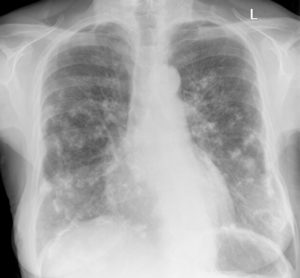Asbestos Exposure and Pleural Diseases

Inhalation of asbestos fibers has been linked to many different kinds of respiratory problems.
It can often take decades for these problems to show up, with symptoms developing 20-50 years after the initial exposure to asbestos.
As asbestos fibers continue to irritate the pleura, changes occur that make it harder for it to do its job. Over time, pleural diseases can develop as a result.
When you breathe, your lungs move against your chest wall. The pleura, which covers the rib cage as well as your lungs, produces fluid that acts as a sort of lubricant.
Asbestos fibers lodge in the lower portions of the lungs, where they gradually irritate the lining of the lungs (pleura). This irritation can get so severe that it eventually leads to scarring.
Call Sokolove Law now at (800) 647-3434 if you or a loved one have been diagnosed with an asbestos-related pleural disease. Compensation may be available.
Asbestos-Related Pleural Diseases
Anyone who has been exposed to asbestos may be at risk for serious lung and pleural diseases.
The risk is higher for people who worked in certain trades — shipyard and railroad workers, construction workers, veterans of all military branches but particularly those who served on U.S. Navy ships, and many others.
Asbestos-related pleural diseases and issues include:
- Mesothelioma: This malignant cancer develops in the protective lining of the lungs and chest wall before spreading throughout the body
- Pleural effusion: This is an abnormal buildup of fluid in the area between the pleura and lung, also referred to as “water on the lungs”
- Pleural plaques: A pleural plaque is a small, hard structure that forms in the pleura and can be a sign of asbestos exposure
- Pleural thickening: Pleural thickening results from severe scarring of the pleura, with more severe symptoms and widespread scarring than pleural plaques
Sadly, many of the companies that manufactured asbestos-containing products knew about the dangers of exposure — but hid them from the public, military, and government, putting thousands at risk.
For over 45 years, Sokolove Law has fought on behalf of our clients to hold these companies accountable for their greed and negligence.
Billions Recovered Nationwide
We’ve recovered over $5.1 Billion for thousands of asbestos exposure victims and their families nationwide. Let us get you the results you deserve.
Pleural Effusions
A pleural effusion, one of the more common consequences of prolonged asbestos exposure, occurs when too much fluid accumulates between the pleura and lungs.
In some instances, people with pleural effusions don’t have any symptoms. They only learn about their condition when they have a chest X-ray for another issue.
However, many people do experience symptoms, some of which include:
- A dry cough
- Chest pain
- Trouble breathing
If someone develops severe symptoms from pleural effusion, a thoracic surgeon may need to perform a procedure in which a small tube, known as a shunt, is inserted to drain excess fluid into the abdomen.
When a pleural effusion becomes severe, part of the lining may need to be removed. This procedure is known as pleurectomy and decortication (P/D).
Pleural Mesothelioma
Pleural mesothelioma is often caused by inhaling tiny needle-like asbestos fibers that the body can’t get rid of by coughing. The fibers build up in your lungs and affect the lining of the lungs and chest wall.
Over time, the inhaled asbestos particles cause inflammation of the mesothelium (also called the pleura), causing the healthy cells to mutate into cancer cells over the next 20-50 years.
Pleural mesothelioma symptoms include:
- Coughing up blood (hemoptysis)
- Difficulty breathing
- Fever and sweating
- Frequent dry or painful coughing
- Lumps of tissue under the skin around the chest
- Pleural effusions (fluid buildup in the lungs)
- Shortness of breath
- Tightness across the chest
- Unexplained weight loss
- Weakness and fatigue
Unfortunately, mesothelioma can be difficult to correctly diagnose, according to the American Cancer Society.
Many of the initial symptoms of pleural mesothelioma can be confused with other respiratory conditions, causing this disease to be misdiagnosed and further delaying treatment.

Mesothelioma patients may want to seek a second opinion from another medical specialist if you have any of the symptoms above. It can help to mention if you may have been exposed to asbestos to your doctor.
Sadly, as with many types of cancer, pleural mesothelioma can be costly to treat, adding up to hundreds of thousands of dollars each year.
Get Help Paying for Treatment
Our asbestos exposure lawyers can fight on your behalf for the compensation you need. Take the first steps toward justice now.
Asbestos Pleural Plaques
Pleural plaques refer to tiny structures with hard surfaces that form in the pleura. They are the most common pleural disease caused by asbestos exposure.
The plaques will usually grow larger, and become harder depending on the person’s age and amount of asbestos exposure.
In most cases, pleural plaques aren’t considered to be a serious problem. However, some research suggests that pleural plaques could increase the risk of laryngeal cancer.
Pleural plaques will typically not lead to any symptoms, and many people can live with them for years without knowing they exist. This type of plaque can’t be removed.
Pleural Thickening
 Also caused by exposure to asbestos, pleural thickening refers to severe scarring of the pleura. Though similar to pleural plaques, the scarring is much more extensive in cases of pleural thickening.
Also caused by exposure to asbestos, pleural thickening refers to severe scarring of the pleura. Though similar to pleural plaques, the scarring is much more extensive in cases of pleural thickening.
Pleural thickening doesn’t just occur in isolated areas. Instead, it extends along the entire chest wall.
Symptoms of pleural thickening symptoms typically don’t present themselves at first, but they can worsen as years go by and eventually lead to severe lung problems.
Pleural thickening symptoms include:
- Coughing
- Difficulty breathing
- Fatigue
- Fever
- Pain while inhaling or exhaling
Treatment for pleural thickening typically starts with respiratory rehabilitation — a health plan to improve the patient’s ability to breathe and overall quality of life. This can include breathing exercises, diet changes, and more.
In some severe cases, patients may need to undergo surgery to remove part of the pleura (known as a pleurectomy).
Asbestos-Related Pleural Disease Compensation Options
If you’ve been diagnosed with an asbestos-related pleural disease, it’s important to know that you do have legal rights and options.
Legal options for compensation may include:
- Filing an asbestos lawsuit against the companies that made or sold the asbestos-containing products you or your loved one were exposed to
- Seeking compensation from the $30 Billion available in asbestos trust funds that’s been set aside by bankrupt companies for future victims
- Submitting a VA claim for benefits and health care (available to veterans with asbestos-related diseases and their families)
When you work with Sokolove Law, we can pursue compensation from all of the avenues you qualify for — at no out-of-pocket cost. We only get paid if you do, so there’s no financial risk to working with us.
Diagnosed with a Pleural Disease?
You may be eligible for compensation that we can fight for on your behalf. Get the help you deserve now.
Our Asbestos-Related Pleural Disease Lawyers Can Help
Asbestos exposure can lead to a variety of serious pleural diseases. Invasive treatments are often needed, but this kind of treatment is incredibly expensive. Affording treatment is not something you or your family should have to worry about during such a difficult time.
Thankfully, financial compensation may be available that can help you get the treatment you need.
Many manufacturers of asbestos-containing products knew about the risks but hid them from consumers and workers. Because of this, you may be eligible to take legal action to hold these companies accountable and secure compensation.
For over 45 years, Sokolove Law has helped victims of asbestos-related diseases get the results they deserve, recovering more than $5.1 Billion for clients nationwide.
Get a free case evaluation or call (800) 647-3434 now to see if our asbestos attorneys may be able to help you too.
Asbestos-Related Pleural Disease FAQs
What are asbestos-related pleural diseases?
Pleural diseases are health issues that affect the pleura, the thin membranes composing the lining of the lungs and chest cavity.
Asbestos exposure is often a cause of pleural diseases — like pleural effusions, pleural mesothelioma, pleural plaques, and pleural thickening.
How does asbestos cause pleural diseases?
When inhaled, asbestos fibers can lead to inflammation, scarring, and permanent lung damage decades after exposure.
Over time, this inflammation and scarring can also cause asbestos-related pleural diseases, including pleural effusions, plaques, thickening, and mesothelioma, a form of cancer that’s nearly always fatal.
Can you file an asbestos claim for pleural plaque disease?
Potentially, yes. If you or a loved one were diagnosed with asbestos pleural plaques, you may be able to file an asbestos claim for compensation.
Contact Sokolove Law today at (800) 647-3434 to learn more. We can let you know if you have a qualifying case — for free.
What is the average payout for pleural plaques?
It varies. Payouts for pleural plaques and other asbestos-related diseases vary according to a number of different factors in each case like the:
- Duration of asbestos exposure
- Number of asbestos-containing products you were exposed to
- Severity of the diagnosis and symptoms
- Strength of evidence in the case
- Total cost of any medical treatments and care
That said, pleural mesothelioma lawsuits award between $1 Million and $1.4 Million on average.
While pleural plaque payouts may award less, the compensation may still be life-changing for many clients and help to pay for treatment.
What is pleural effusion?
Pleural effusion is an accumulation of excess fluid between the layers of the pleura located near the lungs. As with other pleural diseases, pleural effusion develops after exposure to asbestos.
What are the signs and symptoms of pleural effusions?
Symptoms of pleural effusion include:
- An inability to breathe unless standing or sitting up straight
- Dry cough
- Chest pain
- Shortness of breath
Can pleural effusion be fatal?
Yes. While a malignant effusion can be treated through surgery, it can be life-threatening.
Inhaling or ingesting asbestos fibers can lead to the development of cancer in the pleura. If cancer spreads in the pleura, it can lead to the development of what is known as a malignant pleural effusion.
Is pleural thickening dangerous?
In many cases, yes. Pleural thickening is a progressive disease often caused by asbestos exposure.
Symptoms of pleural thickening become worse as time goes by. In its advanced stages, pleural thickening can be very serious and cause severe lung disease.
What is the pleura?
The pleura is a thin membrane that covers the lungs and chest cavity. It’s filled with fluid that helps the membrane glide smoothly as the lungs inhale and exhale.
